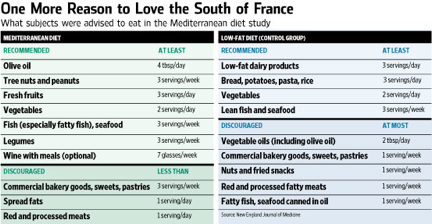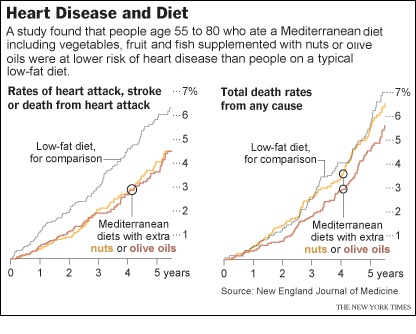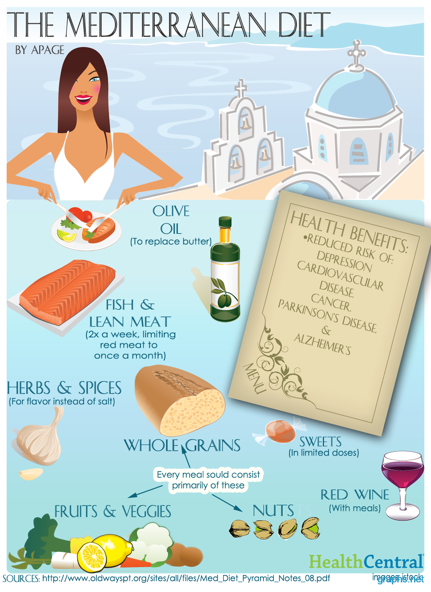Can the Mediterranean Diet Reduce Your Risk of Heart Disease?
 Until recently, scientists had loosely attributed the Mediterranean diet to lower rates of heart disease, but had yet to firmly support this assertion with a solid base of evidence. In previous studies, scientists and medical doctors were unable to tell whether it was the Mediterranean diet that was having the heart helping impact, or whether it was the prescribed drugs that subjects were taking in parallel. About five years ago, a set of scientists decided to test the Mediterranean diet once and for all by conducting a large and long-term study. The results recently came out, and FoundHealth is here to break it down. Here are the details:
Until recently, scientists had loosely attributed the Mediterranean diet to lower rates of heart disease, but had yet to firmly support this assertion with a solid base of evidence. In previous studies, scientists and medical doctors were unable to tell whether it was the Mediterranean diet that was having the heart helping impact, or whether it was the prescribed drugs that subjects were taking in parallel. About five years ago, a set of scientists decided to test the Mediterranean diet once and for all by conducting a large and long-term study. The results recently came out, and FoundHealth is here to break it down. Here are the details:
The Study:
The study included 7,500 patients ranging from 55-80 years old. These subjects were at high risk of heart disease due to various reasons like diabetes, a family history of heart disease, or high blood pressure. The study was conducted over five years. Three groups were created:
- Group 1: Assigned a low-fat diet and given instructions on how to follow it.
- Group 2: Prescribed the Mediterranean Diet with an extra emphasis on extra-virgin olive oil. They were instructed to use at least four tablespoons per day.
- Group 3: Designated Mediterranean Diet was an additional combination of walnuts, almonds, and hazelnuts. They were instructed to eat an ounce of the nutty mix per day.
Both groups assigned to the Mediterranean Diet were instructed to eat fish at least three times per week, legumes three times per week, a serving of fruit three times per day, and a serving of vegetables two times per day. They were also instructed to eat white meat instead of red, and also had the option to drink up to seven glasses of wine per week with meals. They were instructed to remove from their diet commercially made cookies, cakes, and pastries, and to limit their consumption of dairy products and processed meats.
The Results:
After approximately five years, researchers found that the Mediterranean diet cut the risk of heart attacks, strokes, and deaths from heart disease by 30 percent. Researchers also concluded that those who ate the Mediterranean diet were less likely to die overall in the five years compared to the control group. Overall, scientists counted 109 heart attacks, strokes or deaths from heart disease in the control group, which did not eat the Mediterranean diet.
Reflecting on the study, Dr. Estruch said he thought the effect of the Mediterranean diet was due to the diet as a whole, not just the olive oil or nuts, and that he did not expect to see results within five years.
The significance of the study is emphasized by the size, length, and controlled nature of the study. “And the really important thing — the coolest thing — is that they used very meaningful endpoints. They did not look at risk factors like cholesterol or hypertension or weight. They looked at heart attacks and strokes and death. At the end of the day, that is what really matters,” said Rachel Johnson, professor of nutrition at the University of Vermont and a spokeswoman for the American Heart Association.
“Even the best available drugs, like statins, reduce heart disease by about 25 percent, which is in the same ballpark as the Mediterranean diet,” said Dr. Walter Willett, professor of epidemiology and nutrition at the Harvard School of Public Health. “As a doctor it is easier to say take a pill,” Estruch added. “But diet is a very powerful effect in protecting against cardiovascular disease.”
What Does This Mean for YOU?
The evidence is clear that the Mediterranean diet is a great choice for those who are health conscious. So now the ball is in your court – Are you ready to take your diet on a Mediterranean excursion? In case you needed any more convincing, take a look at the health benefits:
- Longer lifespan
- Lower risk of dying at any age
- Lower risk of dying from heart disease
- Lower risk of dying from cancer
- Lower risk of developing Type 2 diabetes
- Lower risk of hypertension (high blood pressure)
- Lower risk of raised cholesterol levels
- Lower risk of becoming obese
- Lower risk of developing Alzheimer’s disease
- Lower risk of developing Parkinson’s disease
So what are you waiting for?! Get started! Good luck!
Learn more about the Mediterranean Diet. Do you already incorporate Mediterranean foods into your diet? Tell us how it works for you! Leave a comment!
3 Responses to Can the Mediterranean Diet Reduce Your Risk of Heart Disease?
Leave a Reply to http://www.Appsmarketinggroup.com Cancel reply
Your email address will not be published. Required fields are marked *
*
*
You may use these HTML tags and attributes: <a href="" title=""> <abbr title=""> <acronym title=""> <b> <blockquote cite=""> <cite> <code> <del datetime=""> <em> <i> <q cite=""> <strike> <strong>
Join Our Community
Archives
- January 2023
- December 2022
- September 2022
- August 2022
- June 2022
- May 2022
- April 2022
- March 2022
- February 2022
- January 2022
- December 2021
- November 2021
- October 2021
- September 2021
- August 2021
- July 2021
- June 2021
- May 2021
- March 2021
- September 2020
- August 2020
- July 2020
- June 2020
- May 2020
- April 2020
- March 2020
- February 2020
Subscribe

Sign up to receive FREE toolkit
From Dr. Hyman, #1 NY Times & Amazon Author
We never spam or sell your e-mail










[...] Can the Mediterranean Diet Reduce Your Risk of Heart Disease? |. This entry was posted in Uncategorized by babe. Bookmark the permalink. [...]
I’d like to see a baseline group of “do nothing but what you’re already doing” the SAD group… and see the stats for that one in comparison. I’m not sure I’d want to be put in that group though!
I’m eextremely inspired with your writing talenhts as neatly as with the
structure in your blog. Is that this a paid subject or didd yyou modify it your self?
Anyway keep upp thhe excellent quality writing,
it is rare to look a great blog like this one nowadays..